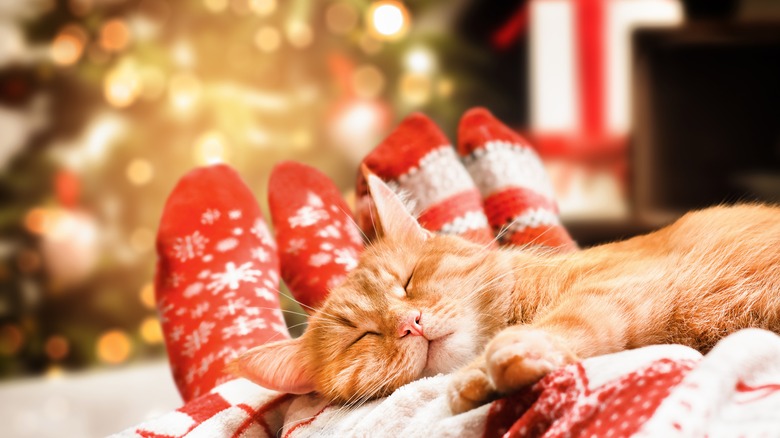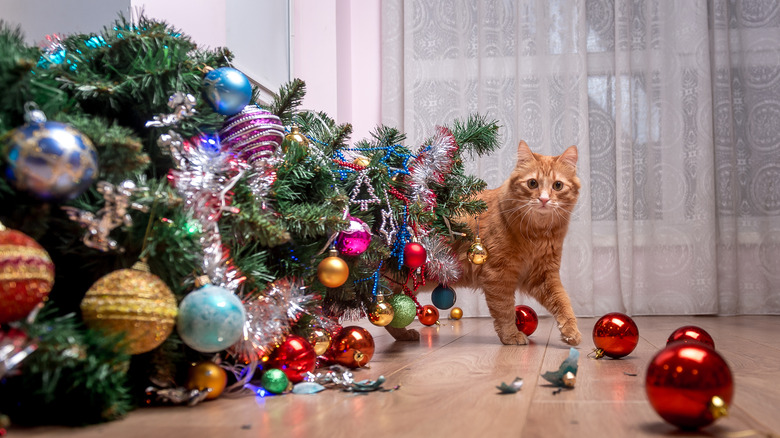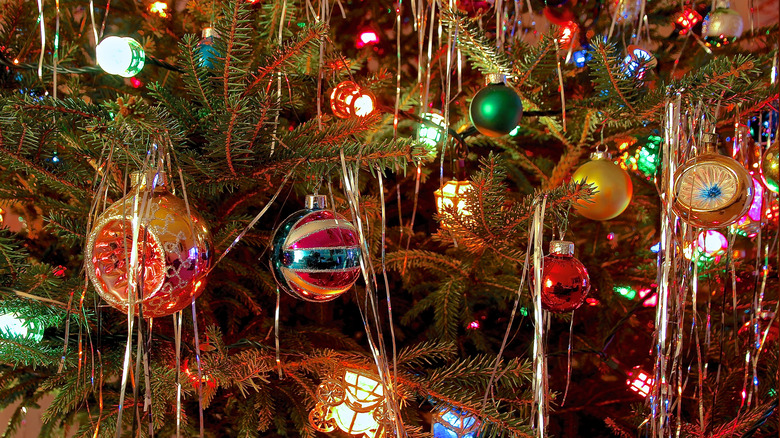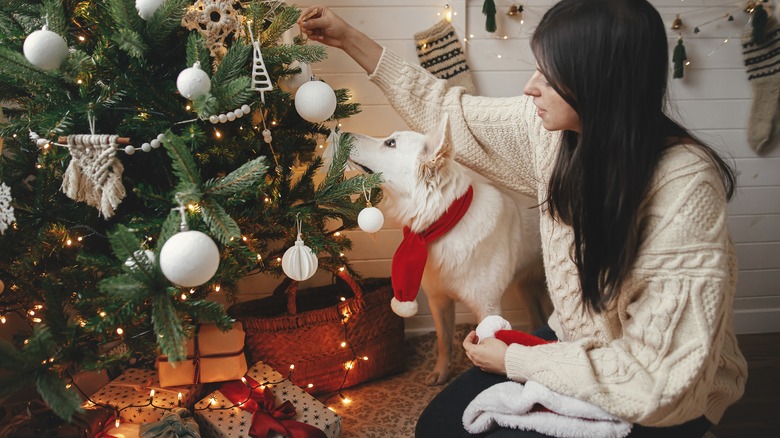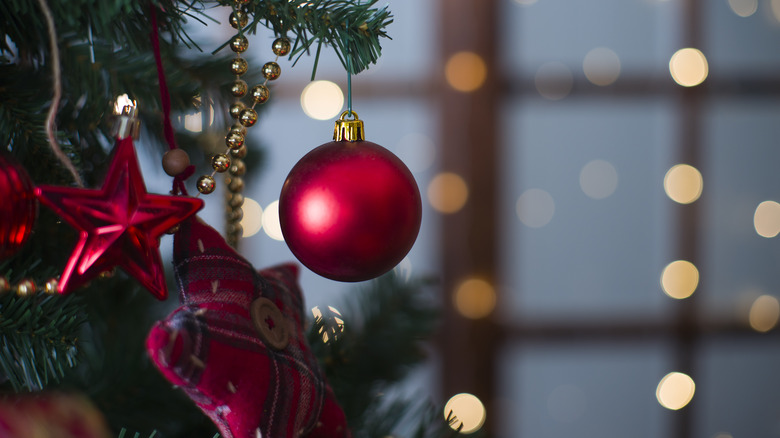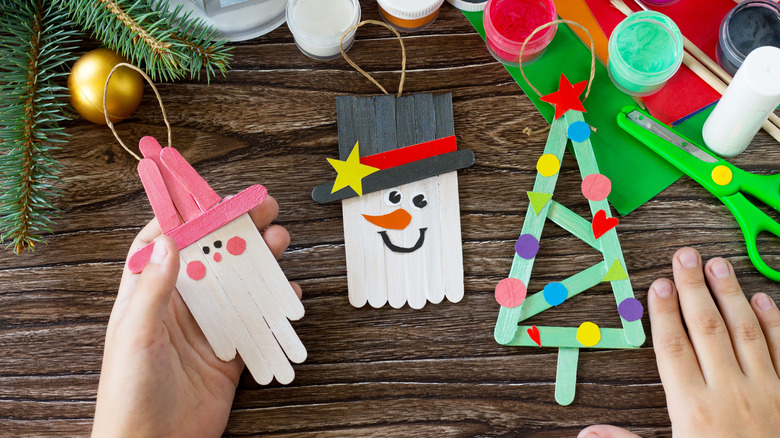How To Keep Your Pets Safe Around The Christmas Tree
Christmas is a special time to spend with loved ones, and that includes your family pets. Whether you're outside playing in the snow or curled up on the couch, your furry friends keep you company, and in return, you do your best to keep them safe. As you gather to enjoy the season with your family, it's common to spend time around the Christmas tree, which adds warmth and coziness to your home. However, you may be unaware that your festive tree poses some dangers to your pet.
Christmas tree safety has come a long way since the days of attaching small candles to the branches, but with modernization comes new hazards. According to a survey completed by Value Penguin, over 70% of participants who owned pets in 2021 reported that their furry companions have knocked over their tree, with about half of those fallen trees causing damage. To keep the season merry and bright for everyone in the home, make sure your Christmas tree is safe for your pets.
Secure your tree
Everyone has seen the viral videos of cats and dogs jumping on Christmas trees just before the tree crashes to the floor. The videos are funny, but the potential injuries are not. To keep your pet safe and your tree intact, Rover suggests securing your tree to the wall or ceiling, and with pets in the house, a corner is the safest location. This spot will protect your tree from your furry friends on two sides while making it easy to anchor it to the wall.
To be sure your tree fall-proof without the ties looking distracting, use clear fishing line or neutral-colored string to wrap around the trunk about halfway up the tree. Then, tie the string to an eye hook screwed securely into the wall. With the tree attached to the wall in the middle, your pet will not be able to tip it over from the top or the bottom; this protects it from both climbing cats and roughhousing dogs.
Say no to tinsel
Tinsel seems like it would be a safe way to add a shimmer to your tree, but if you have pets, those sparkly strings can create a medical emergency, according to Pet Poison Helpline. While it's not actually poisonous, tinsel can look like a tempting edible to animals. If cats or small dogs ingest tinsel, it can get stuck throughout their digestive tract. This rule applies to all stringy items like long decorative ribbons or yarn. These items can get wrapped around your pet's tongue, stuck in their stomach, or damage their intestines. A bit of sparkle is not worth an expensive or potentially deadly outcome.
To get more gleam on your Christmas tree without endangering your pets, consider cutting up strings of large shiny beads into 12-inch lengths to drape over each branch. Sparkly bows made of wide ribbon or faux flowers tucked between branches can also safely add interest to your tree.
Hazards of real Christmas trees
If you have a live tree, there are some ways in which it can make your pet sick. Depending on the type of tree you have, allowing your pet to chew on the branches or needles can cause mild to severe digestive issues. The oils from a fir tree can cause mouth irritation and gastrointestinal distress, according to Pet MD. Pine tree needles are particularly troublesome if consumed. The sharp points can puncture the lining of your pet's digestive system, which would cause a serious health emergency.
The water you use to keep your Christmas tree green and lush can also be harmful to your pet. Hartz explains that this water can contain toxins like pesticides, fertilizers, and even aspirin to keep the tree alive throughout the season. Keep your tree water covered and inaccessible to pets to prevent potential poisoning. Placing a gate or other barrier around the tree, or using pet repellant spray, can help keep pets safe and away from a real Christmas tree.
Consider non-glass ornaments
Even if your tree has been securely fastened to the wall, as it should be, those sparkly ornaments may be a temptation for your pet. Cats are particularly fond of chasing round, shiny objects, and they're adept climbers. If you have furniture anywhere near your tree, no ornament is safe from curious kitties. While glass has historically been the material of choice for ornaments, shatterproof options have become increasingly refined in recent years, offering beauty and safety, states Lightbulbs.com. These plastic options are not only good for homes with pets; if you have little ones who want to help decorate the tree, you can use shatterproof ornaments without worrying the kids will get hurt. Even steady-handed grownups can drop a glass ball which will surely shatter on a solid surface floor.
Plastic is not your only option for pet-safe tree décor. Handcrafted wood ornaments and DIY paper snowflakes tucked into the tree add to the Christmas spirit in your home without any concern about harmful glass shards.
Avoid edible ornaments
While the ingredients in some ornaments made from edible products are safe for pets, there are many reasons why it's best to leave those off your tree, according to The Daily Wag. Perhaps the most obvious reason to forego the popcorn garland is that it will attract your pets to the tree, when what you really need to do is entice them to stay away. How long would your tree stay standing if Fido decided to consume an entire string of popcorn? Salt dough ornaments are fun to make, but could cause salt poisoning in your pet. Sweet treats, like candy canes, can also make your pet sick.
If you really want to make your own ornaments, opt for those that do not include food. There are so many low-cost DIY Christmas tree ornament ideas to choose from; you won't have to miss out on family-friendly holiday crafts in order to keep your favorite furry family members safe throughout the season. After all, we're pretty sure you can make just about anything out of popsicle sticks.
